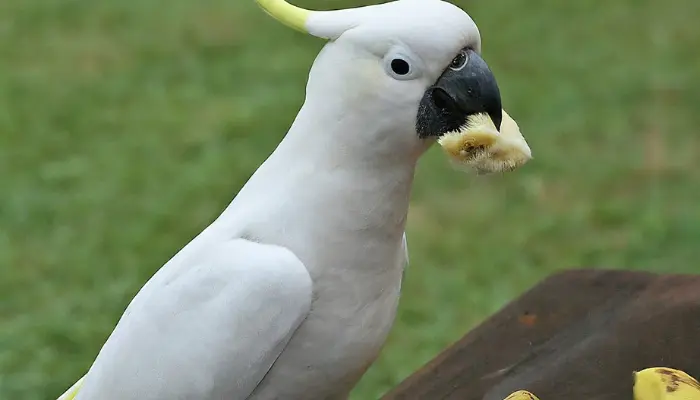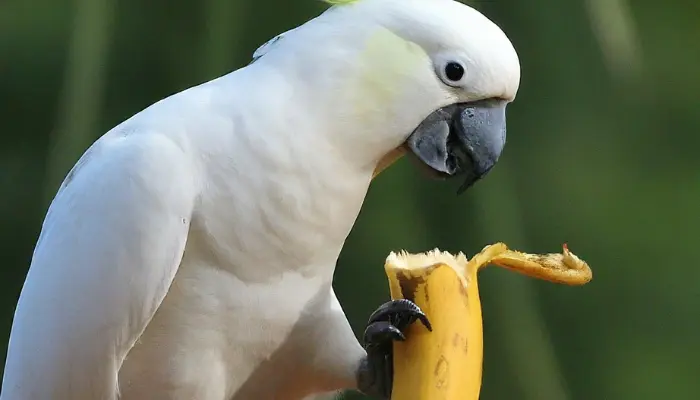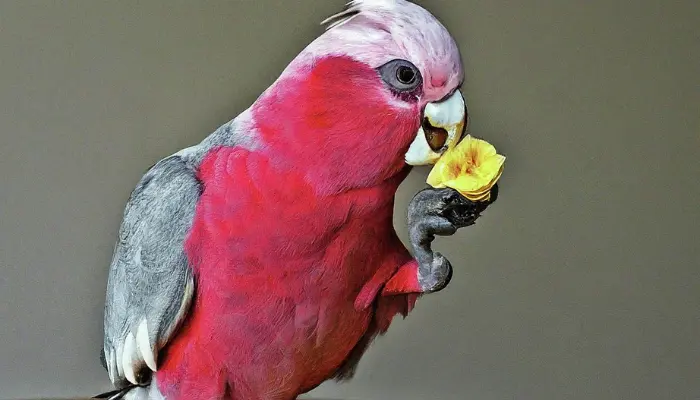When it comes to the dietary habits of pet birds, particularly cockatoos then owners often find themselves questioning which fruits are safe and beneficial. Among the myriad of options, bananas stand out as a popular choice due to their sweetness and nutritional value.
However, it is crucial to understand whether this tropical fruit aligns with the unique dietary needs of cockatoos. In this article, we delve into the compatibility of bananas with a cockatoo’s diet, examining the potential benefits and any precautions owners should consider to ensure their feathered companions remain healthy and happy.
Can cockatoos Eat Bananas?
Yes, cockatoos can eat bananas and they often enjoy this sweet and nutritious fruit as part of their diet. Bananas provide a good source of vitamins and minerals, such as vitamin A, vitamin C, potassium, and dietary fiber, which are beneficial for their overall health.
Providing a balanced diet that includes a variety of fruits, vegetables, seeds, and pellets is essential for maintaining the health and well-being of cockatoos. Always ensure the bananas are fresh, ripe, and free from pesticides before feeding them to your feathered friend.

Nutritional Profile Banana
Here is a nutritional profile of a medium-sized banana (about 118 grams) in table format.
| Nutrient | Amount per Medium Banana (118g) |
|---|---|
| Calories | 105 |
| Total Fat | 0.3g |
| Total Carbohydrate | 27g |
| Dietary Fiber | 3g |
| Sugars | 14g |
| Protein | 1.3g |
| Potassium | 422mg |
| Magnesium | 32mg |
| Vitamin C | 10.3mg |
| Vitamin B6 | 0.4mg |
These points highlight the most significant nutritional aspects of a medium banana.
Nutritional Benefits of Bananas for Cockatoos
Bananas can be a nutritious addition to a cockatoo’s diet when given in moderation. Here are some of the key nutritional benefits.
- Vitamin A: Essential for vision, immune function, and skin health.
- Vitamin C: Important for immune support and overall health.
- B Vitamins (B6 and Folate): Crucial for energy production, nervous system function, and red blood cell formation.
- Potassium: Helps with muscle function, nerve signaling, and fluid balance.
- Magnesium: Supports metabolic processes and muscle function.
- Manganese: Important for bone health and metabolic processes.
- Fiber: Promotes healthy digestion and prevents constipation.
- Antioxidants: Protect cells from oxidative damage, contributing to overall health.
- Natural Sugars: Provide a quick source of energy.
When feeding bananas to cockatoos, it is important to remember.
- Moderation: Bananas are high in sugar, so they should be given as an occasional treat rather than a staple food.
- Variety: Cockatoos require a varied diet to meet all their nutritional needs, including fruits, vegetables, grains, and specially formulated pellets.
Always remove any uneaten fruit to prevent spoilage and attract pests.

Potential Health Risks of Bananas for Cockatoos
Bananas can be a healthy treat for cockatoos. But there are potential health risks associated with feeding them to these birds. Here are some considerations.
- High Sugar Content: Bananas are high in sugar, which can lead to obesity and related health issues if fed in excess. Cockatoos have a metabolism that is not adapted to handle large amounts of sugar, so moderation is key.
- Nutrient Imbalance: Relying too much on bananas can cause an imbalance in the bird’s diet. Cockatoos require a varied diet that includes seeds, nuts, fruits, vegetables, and formulated pellets to ensure they receive all necessary nutrients.
- Digestive Issues: Some cockatoos might experience digestive problems such as diarrhea if they consume too many bananas, due to the fruit’s high fiber content and sugar levels.
- Pesticide Residue: Non-organic bananas can have pesticide residues on their skins. Even though cockatoos typically do not eat the banana peel, handling the fruit and then touching other foods could potentially transfer these chemicals.
- Choking Hazard: Although rare, pieces of banana that are too large or sticky could pose a choking risk. It’s important to cut the banana into appropriate sizes for the bird to manage safely.
To mitigate these risks, bananas should be given as an occasional treat rather than a dietary staple. Always ensure a balanced diet and consult with a veterinarian to tailor the best dietary plan for your cockatoo.
Conclusion
bananas can be a healthy treat for cockatoos if given in moderation. They provide important vitamins, minerals, and fiber. However, because of their high sugar content, they should not be a main part of the diet. Cockatoos need a balanced diet with various fruits, vegetables, grains, and special pellets. Always check with a vet to ensure your cockatoo gets the best diet, allowing them to safely enjoy bananas occasionally.
